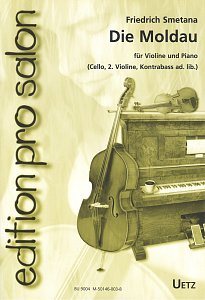Edition Pro Salon: Die Moldau by B. Smetana / violin + piano (string quartet)
| Publisher | UETZ |
| Genre: |
classical & sacret
all time favorites |
| Arrangement: | score + parts |
| Cast: |
duet
small ensemble (up to 10 musicians) |
| Difficulty: |
Intermediate
Advanced |
| Format: | set (score + parts) |
| Series: | Edition Pro Salon |
Parameters
| Product code: | BU9004 |
| Composer: | Smetana, Bedřich |
| Arranger: | Rössler, Uwe |
| No. of songs: | 1 |
| Language: | German |
| Size: | 21 x 29 cm |
Songlist (1)
- Die Moldau (Vltava)
Product description
The Edition Pro Salon offers you beautiful and well-known compositions in a nice arrangement for small string and chamber ensembles. This set brings you a main theme of the piece VLTAVA, one of the most popular melodies written by Bedřich Smetana. We offer this composition in arrangements for violin and piano with optional additional parts for second violin, violoncello, double bass, flute and clarinet. From the original arrangement for the violin and piano, you can create a small to seven-member salon (chamber) orchestra. The book include piano accompaniment plus separate parts for individual instruments.
Bedřich Smetana (1824 - 1884) was a Czech composer of the Romantic period. He is one of the most famous Czech composers. From his early youth he was devoted to music, especially piano playing and composition. During his lifetime he worked as a concert pianist, music teacher, conductor and music critic. Smetana wrote mainly operatic and symphonic works. His piano works, concentrated in the early stages of his compositional activity, also occupy a considerable volume in his oeuvre. His chamber music is represented by rare, though substantial, works, and his choruses and songs occupy a rather marginal position. At the age of fifty he became completely deaf, but even after his hearing loss he was able to compose a number of masterpieces. Throughout his work he strove to create a distinctive Czech musical style.







